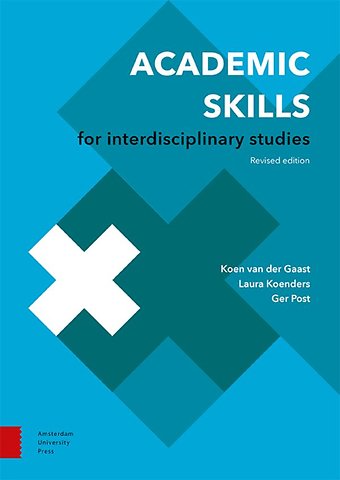


Koen van der Gaast werkte drie jaar als docent bij het Instituut voor Interdisciplinaire Studies bij de bacheloropleiding Future Planet Studies.
Meer over de auteursAcademic Skills for Interdisciplinary Studies
Revised Edition
E-book Epub met watermerkbeveiliging Engels 2024 1e druk 9789048569939Samenvatting
What’s a theoretical framework for? How do you effectively present your data in a figure? What’s the secret to a good presentation?
As an interdisciplinary student, you delve into theories and research methods from a whole range of disciplines. Academic skills are the tools that you can use to take in, develop, integrate and question knowledge. This guide provides specific instructions, tips and examples to help students develop these skills, both during and after their studies.
As academic education focuses on research, the empirical cycle forms a key theme of the book, including when discussing the following skills:
- Searching for, critically reading and analysing scholarly texts
- Formulating research questions
- Making concepts measurable, qualitatively and quantitatively
- Organizing literature and data
- Analysing and formulating an argument
- Academic writing
- Collaborating
- Reflecting
- Presenting
Trefwoorden
academische vaardigheden onderzoek interdisciplinair onderzoek wetenschappelijk schrijven onderzoeksvraag literatuuronderzoek argumenteren presenteren operationaliseren citeren kwalitatief onderzoek kwantitatief onderzoek samenwerken interviews kritisch denken wetenschappelijke literatuur feedback leesstrategieën data-analyse peer review plagiaat reflecteren theoretisch kader wetenschappelijke databases datavisualisatie betrouwbaarheid validiteit abstract concepten onderzoeksinstrumenten
Trefwoorden
Specificaties
Lezersrecensies
Over Laura Koenders
Over Ger Post
Inhoudsopgave
Introduction 11
About this book 11
Central theme: research practice and the empirical cycle 11
Part 1 Orientation and reading 14
1 Preparatory reading and searching 15
Familiarizing yourself with a topic 15
Finding your bearings outside the university 16
Finding your bearings at university 16
Finding your bearings between university and society 17
An initial literature search 17
Concepts and theories 17
Scholarly literature 19
Grey literature 20
Academic literature and ‘ordinary’ search engines 21
Scholarly search engines 21
Availability 21
The library 22
Digital search engines and databases 22
Search methods 22
Ordering your search results 24
Continuous search 24
Exploratory reading 25
Speed reading 25
Sources 28
Other useful sources 28
2 Gathering and organizing key information 29
Optimizing your study environment 29
Learning objectives 30
Reading strategies 31
Reading textbooks 31
Reading academic articles and books 32
Systematic reading 33
Organizing information 35
Sources 37
Other useful sources 37
3 Studying thoroughly and critically 38
Sentence-level analysis 38
Types of argumentation 40
Simple argumentation 40
Plural argumentation 41
Coordinating argumentation 42
Subordinate argumentation 42
Implicit motivation 44
Critically evaluating texts 45
Sources 47
Other useful sources 47
Part 2 Making your research measurable 48
4 From your topic to your question 49
Theoretical framework 50
From theories to concepts and dimensions 50
The theoretical framework and interdisciplinary research 52
The problem statement 53
Sources 54
5 Formulating a good question 55
Characteristics of a research question 55
Types of questions 56
Sources 58
6 A testable concept 59
Why operationalize? 59
From dimensions to indicators and variables 60
Operationalization and validity 61
Other forms of operationalization 62
Sources 63
7 Making a research instrument 64
Qualitative versus quantitative 64
When qualitative and when quantitative? 65
Operationalization 67
Structure of the instrument 68
Determining your sample 68
Making a qualitative research instrument 69
Formulating interview questions 70
From indicators to topic lists or questionnaires 70
Order of the questionnaire 70
Phrasing interview questions 71
Validity and reliability of your instrument 72
Assessment by an ethics committee 73
Sources 74
Other useful sources 74
Academic Skills for Interdisciplinary Studies 7
Part 3 Doing and writing up research 76
8 Research practice 77
Research practice: quantitative research 77
Safeguarding the validity of quantitative research 77
Keeping a log 79
Organizing your data 80
Getting familiar with your data 80
Research practice for qualitative research: conducting interviews 81
Before the interview 81
During the interview 81
After the interview 83
Analysing the interview 84
After coding 86
Sources 87
Other useful sources 87
9 The structure of your article 88
Argumentation structure 88
Objections 89
Framing an argument: pitfalls 92
The structure of a scholarly article 93
The introduction 96
The middle section 97
The literature review 97
The research article 98
Methodology 98
Results 99
Presenting data 100
Figures 100
Table 101
The discussion and the conclusion 101
Valorization 103
Sources 103
10 Finishing your article: academic writing, titles, and abstracts 104
The title and the abstract 104
Writing clearly 104
Academic language use 106
Sources 108
Other useful sources 108
11 Citing sources and the bibliography 109
Reference management software 110
In-text citations 112
Quotes 112
Paraphrasing 113
Citations in the bibliography 114
Journals 115
Books 116
Research reports 117
Internet resources 117
Personal communication and interviews 117
Sources 118
Other useful sources 118
Part 4 Reflecting and communicating 120
12 Preventing fraud and plagiarism 121
Plagiarism of written work 121
Plagiarism of fellow students 121
Working responsibly in a team 122
Fraud: falsifying data 122
13 Collaboration, feedback, and peer review 124
Collaborating: drawing up a team charter 124
Evaluating teamwork 127
Giving and receiving feedback 127
Feedback on behaviour 127
Feedback on content 129
Peer review 130
Reflecting on assumptions 131
Sources 132
Other useful sources 132
14 Presenting 133
Defining the theme of your presentation 133
Structure and coherence 134
Visual aids 135
Using figures, tables, images, or film clips 136
Presentation skills 138
Practising your presentation 140
Leading a discussion 140
Ask good questions 140
Creating a safe atmosphere 142
Giving poster presentations 143
Points to bear in mind when designing a poster 143
Your elevator pitch 144
Sources 145
Other useful sources 145
Academic Skills for Interdisciplinary Studies 9
Appendices 146
Appendix A Sample literature review 148
Appendix B Sample research article 158
Index 169
Rubrieken
- advisering
- algemeen management
- coaching en trainen
- communicatie en media
- economie
- financieel management
- inkoop en logistiek
- internet en social media
- it-management / ict
- juridisch
- leiderschap
- marketing
- mens en maatschappij
- non-profit
- ondernemen
- organisatiekunde
- personal finance
- personeelsmanagement
- persoonlijke effectiviteit
- projectmanagement
- psychologie
- reclame en verkoop
- strategisch management
- verandermanagement
- werk en loopbaan